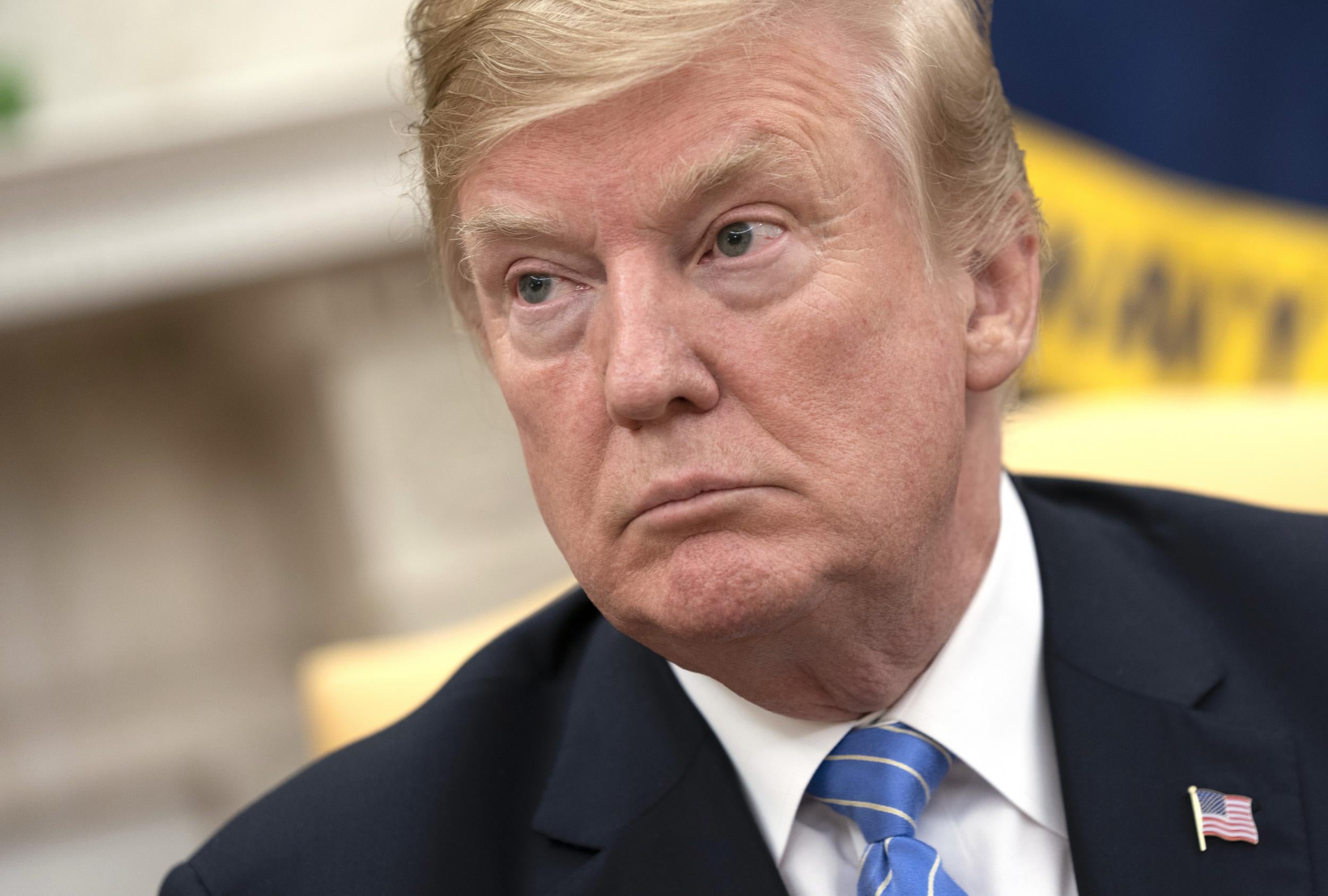Trump viewed less favourably than Putin or Xi, major worldwide survey reveals
Global report finds president's support in bottom third of world leader rankings

Donald Trump is viewed less favourably around the world than Russian President Vladimir Putin and Chinese President Xi Jinping, according to the latest survey from the Pew Research Centre, which reports that the US president's ratings remain exceptionally low globally.
Mr Trump ranks in the bottom third of favourability ratings, with a median of 64 per cent of international respondents claiming they don't have any confidence in the president to "do the right thing" when it comes to world affairs.
Respondents expressed the least amount of confidence in the US president out of the world leaders they were asked to compare him with. The survey of nearly 37,000 people in 33 countries asked whether respondents have a lot of confidence, some confidence, or not much confidence in Mr Trump, and most respondents answered "no confidence at all".
German Chancellor Angela Merkel received the highest marks among the five world leaders that Pew included in its survey. A median of 46 per cent of respondents expressed confidence in her leadership.
In all, the US president ranks last among the five world leaders in the survey
Donald Trump celebrity president: A decade in two halves
Show all 29While majorities also express "no confidence" in presidents Putin (57 per cent) and Xi (43 per cent), Mr Trump's median unfavourability came in at 64 per cent, with his lowest ratings in Mexico (8 per cent), Turkey (11 per cent), Tunisia (12 per cent) and Germany (13 per cent).
In the UK, 41 per cent of respondents have a favourable view of the US as a whole, but 48 per cent of respondents have no confidence in the US president.
The survey was carried out months before Mr Trump's December appearance at a Nato summit that he abruptly abandoned after an embarrassing video appeared to capture world leaders mocking the US president, which his political rivals pointed to as an example of his increasingly unreliable world leadership.
Conducted between May and October last year, the survey also pre-empted the president's impeachment hearings and White House decision to kill Iranian General Qassem Soleimani.
The report shows that attitudes towards the US as a whole are largely positive, but views about the US and its president are largely dependent on respondents' placement on the ideological spectrum. Right-wing respondents, particularly in countries with influential populist movements, are more likely to support Mr Trump than people who identify as politically left.
Views of Mr Trump are closely linked to attitudes towards the country as a whole, at both an individual level and across countries, according to the report. In nearly every country surveyed, people with a favourable view of the US are more likely than those with an unfavourable view to have confidence in the president.
The report notes that the ideological divide is "particularly sharp" in several countries, such as Israel, where there are 50 percentage points between people on the right and the left when it comes to support for the president. Fully 94 per cent of Israeli Jews see the US favourably, compared to only 37 per cent of Israeli Arabs.
The US received its most positive reviews in Europe from three Central and Eastern European nations: 79 per cent of Poles, 70 per cent of Lithuanians and 66 per cent of Hungarians have a favourable opinion of the United States.
Europe's lowest ratings for the US are in the Netherlands (46 per cent), Sweden (45 per cent) and Germany (39 per cent).
Differences of 20 percentage points or more can also be seen in most of Europe and in Australia, South Korea and Brazil.
Support for Mr Trump's signature policy decisions — including tariffs, a wall along the US-Mexico border, anti-immigration efforts, and the US withdrawal Paris climate accords — is also overwhelmingly low internationally.
Though a majority of respondents disapprove of the US withdrawal from the nuclear agreement with Iran (52 per cent), it's not a nearly-even split; only 29 per cent of respondents approve of the decision, and 66 per cent of Middle Eastern countries surveyed disapproved of the move.
In the three Middle East and North African nations included in the survey, large majorities disagree with Mr Trump's decision to move the US embassy in Israel to Jerusalem from Tel Aviv, including 93 per cent of Tunisians, 85 per cent of Lebanese and 78 per cent of Turkish respondents.
But 74 per cent of people in Israel support the move, although the divide falls sharply among Arabs and Jewish Israelis in the country — 82 per cent of Arab Israelis disapprove of the embassy decision, compared to 89 per cent of Jewish Israelis who approve of it.
In 21 of the 33 countries surveyed, those aged 18 to 29 have a more favourable view of the US than people 50 and older.
Subscribe to Independent Premium to bookmark this article
Want to bookmark your favourite articles and stories to read or reference later? Start your Independent Premium subscription today.

Join our commenting forum
Join thought-provoking conversations, follow other Independent readers and see their replies